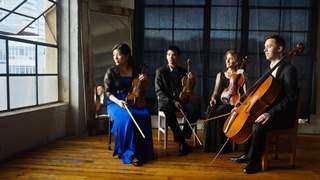|
Back
The Century-Young Ginastera New York
Americas Society, Park Avenue
12/05/2016 -
“Ginastera and His Contemporaries”:
Alberto Ginastera: Piano Quintet, op. 29
Messias Maiguashca: String Quartet No. 1
Joaquín Orellana: String Quartet No. 1
Vicky Chow (Pianist), Momenta Quartet: Emile-Anne Gendron, Alex Shiozaki (Violins), Stephanie Griffin (Viola), Michael Haas (Cello)

The Momenta Quartet (© John Gurrin)
By far, the most satisfying work came with Ms. Chow’s one contribution on the program, Alberto Ginastera’s Piano Quintet, written in 1963 (he was born a century ago), when the composer had mastered all the techniques of the early 20th Century.
The Momenta Quartet is fearless. I was going to say that pianist Vicky Chow is fearless as well, but everybody in New York already knows that Ms Chow is one of the most inventive, courageous and prominent pianists in the contemporary music scene. Another adjective is superfluous.
Back to the Momenta Quartet. Their performance at the Americas Society playing two totally unknown composers, from Ecuador and Guatemala, as well as that giant of 20th Century music, Alberto Ginastera, took rock-hard playing, a sense of commitment, and all the technical resources which any young quartet must have.
That they succeeded so well for an hour-long program in the beautiful Park Avenue building of the Americas Society was a tribute to their sometimes electrifying performance.
And if the first two composers were totally unfamiliar (save the rare aficionado de la música centroamericana) the determination of the Momenta Quartet may have helped make Joaquin Orellana a household word. (Though I’m unsure whether Messias Maiguashca will achieve that status outside of tongue-twisting competitions.)
Actually, Quito-born Maiguashca, a near contemporary of the great Ecuadorean painter Oswaldo Guayasamín, may not quite reach the aegis of Central American composers, simply because his music has long gone out of style. The Webernian tradition, reaching its apex in Darmstadt, was all the trend in 1964, when Mr. Maiguashca composed it in Buenos Aires. That he discovered Webern while a student of Ginastera made this work inevitable, even as a historic footnote.
Webern himself is familiar enough, but hearing a new work in Webernian style is not exactly caviar for any audience. The five short movements–the centerpiece Homemaje a Webern–was indeed a tribute to the Momenta Quartet. One would imagine that a musicologist would find meter and melody throughout the piece. For this first hearing, one was satisfied that the four musicians produced all the right swirling, left-hand pizzicatos, distortions, and, unceasing tremolos which the composer must have specified. The performance was apparently excellent, but the details remain cryptic.

V. Chow (© Kaitlin Jane)
This was not true for Joaquín Orellana’s Frater Ignotus (unknown brother). The Guatemalan composer, another student of Ginastera, has long given up the usual folk-music-styled compositions, and here made a stab–a very good stab–at something approaching Béla Bartók.
Mr. Orellana began with a long cantilena played by cellist Michael Haas, that music itself apparently surveyed, mirrored and fantasized throughout its single movement. Nothing was “ethnic” about the theme: it could have been distorted Guatemalan or Hungarian. But it led to a variety of imaginative dissolutions, from bravura playing by the instrumentalists and quiet, almost tranquil moments.
The colors could be spiky, but the moods were more harmonic than harsh, and again, one imagines that the Momenta Quartet played it with authentic respect.
Those familiar with his orchestral works would immediately recognize the opening, an explosion of phrases which merged on the anarchic and which continued with serious, evocative and fascinating statements.
The breadth of the first movement–with music that easily dwarfed the first two composers–was followed by a Scherzo fantastico, which came like a series of spirit sounds from all the players. Spirit or even avian, because Ginastera was evidently lapping up Messiaen, and one heard hints of bird song.
The fifth movement, translated as “A Little Night Music” was more Béla Bartók than Mozart. The strings were brushing against each other, playing disconcerting themes, while Ms. Chow’s piano played the most limpid harmonies. (Okay, laugh if you will: but they did sound vaguely like Rachmaninoff!)
The finale was fun, exciting, ending in a stormy tutti.
But this was no four-movement quintet. The second, fourth and sixth “movements’ were cadenzas, which the Momenta carried off well. First the low instruments, viola and cello, then the two violins jolting between tremolos and lyrical melodies. And finally Vicky Chow, who also played jolting, volatile and sometimes super-lyrical melodies together.
The Momenta Quartet gave it all the pulsing needed for this edgy sometimes startling music. Ms. Chow, as always, was that most extraordinary of musicians. Her music was either energetic or (briefly) super-romantic, but never ever easy. She has the hands which can essay anything–and had time between bursting the piano wide open to smile and enjoy all that she was producing.
Like the Momenta Quartet, she was both unafraid and audacious.
Harry Rolnick
|